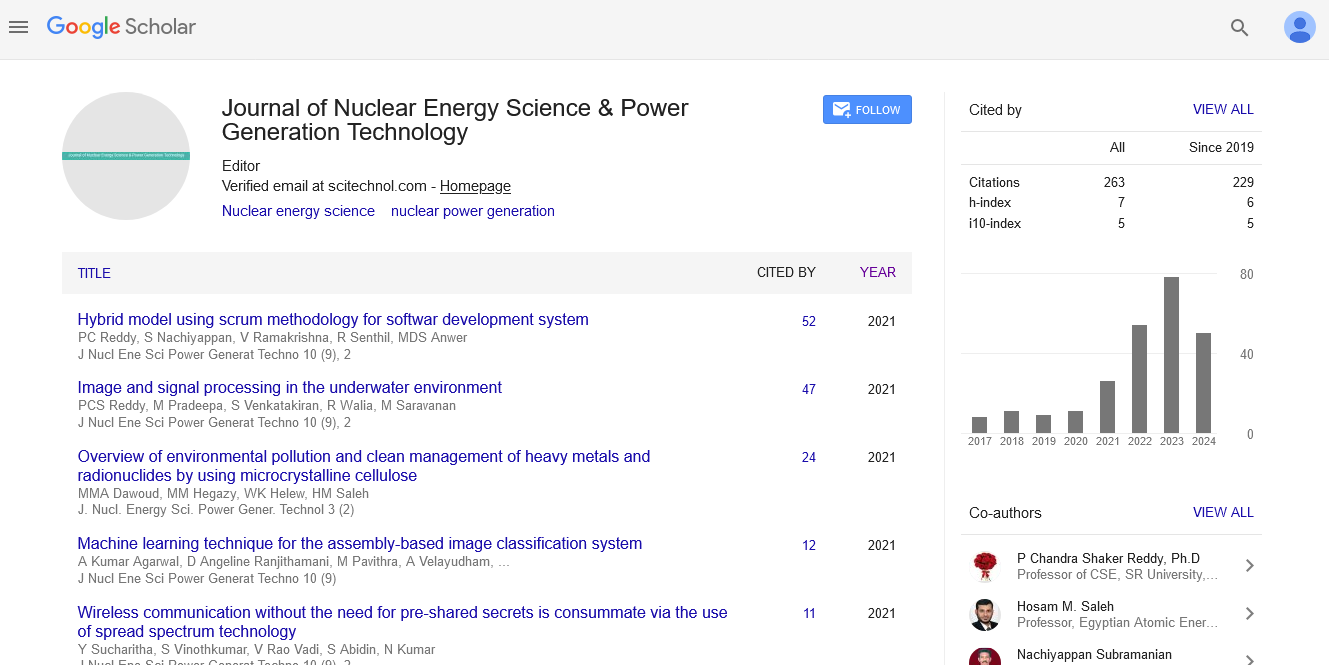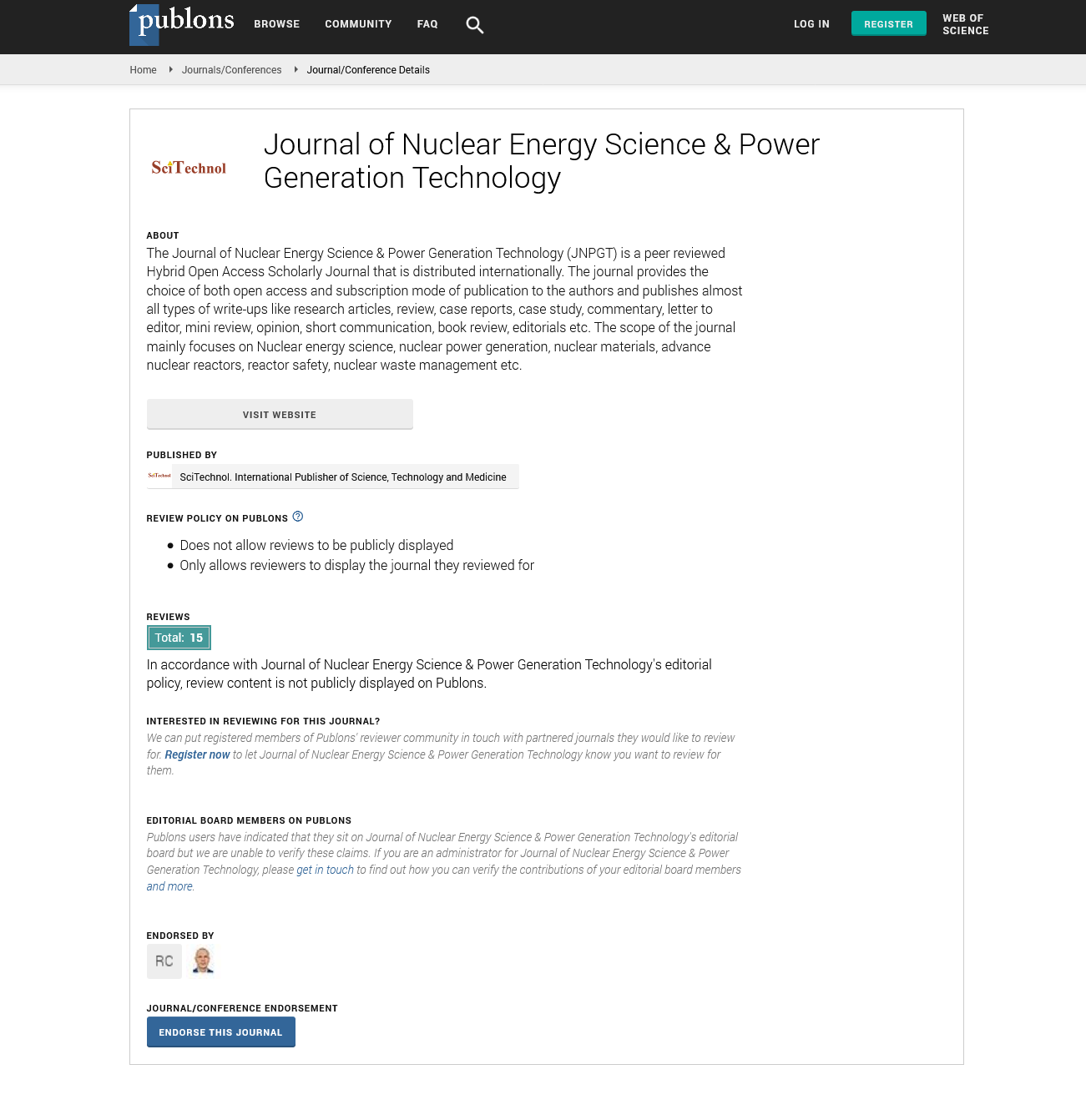Perspective, J Nucl Ene Sci Power Generat Technol Vol: 13 Issue: 6
Role of Nuclear Power in Managing Climate Change and Supporting Energy Security
Emily Stanton*
1Department of Nuclear Engineering, Massachusetts Institute of Technology, Cambridge, USA
*Corresponding Author: Emily Stanton,
Department of Nuclear Engineering,
Massachusetts Institute of Technology, Cambridge, USA
E-mail: emily_stanton12@gmail.com
Received date: 21 October, 2024, Manuscript No. JNPGT-24-154872;
Editor assigned date: 23 October, 2024, PreQC No. JNPGT-24-154872 (PQ);
Reviewed date: 06 November, 2024, QC No. JNPGT-24-154872;
Revised date: 13 November, 2024, Manuscript No. JNPGT-24-154872 (R);
Published date: 21 November, 2024, DOI: 10.4172/2325-9809.1000426.
Citation: Stanton E (2024) Role of Nuclear Power in Managing Climate Change and Supporting Energy Security. J Nucl Ene Sci Power Generat Technol 13:6.
Description
The renewable energy sources such as solar and wind have made significant advances, their alternating nature and scalability issues highlight the need for a reliable, low-carbon energy alternative. Nuclear power emerges as a viable solution, providing both stability and sustainability in the search to reduce Greenhouse Gas (GHG) emissions. Nuclear power is a proven low-carbon energy source, generating electricity without direct GHG emissions. According to the International Energy Agency (IEA), nuclear energy currently prevents approximately 2 gig tons of CO2 emissions annually, making it one of the largest contributors to global decarbonization efforts. This capacity positions nuclear power as an important element in achieving the ambitious targets set by the Paris Agreement to limit global warming to below 2°C. Unlike fossil fuels, which emit vast quantities of carbon dioxide during combustion, nuclear power plants utilize controlled nuclear fission to produce energy. This process not only eliminates carbon emissions but also provides a consistent energy supply, managing the reliability opening often associated with renewable sources.
Nuclear energy exhibits an extreme energy density compared to traditional fossil fuels. A single uranium fuel pellet for instance, can produce as much energy as 1 ton of coal or 120 gallons of oil. This efficiency enables nuclear power plants to generate vast amounts of electricity with minimal environmental impact. While renewable energy sources depend on weather conditions, nuclear power provides a steady and reliable base-load energy supply. This capability ensures that energy grids remain stable, even during periods of low solar or wind activity, complementing renewable technologies in a hybrid energy system. Advancements in nuclear technology, particularly Generation IV reactors and Small Modular Reactors (SMRs). These innovations aim to improve fuel efficiency, enhance safety and reduce radioactive waste, making nuclear power an even more attractive option for long-term energy planning. Building nuclear power plants requires significant capital investment, which can be a barrier for many countries, particularly those in developing regions. Accidents like those at Chernobyl and Fukushima have contributed to public fear and opposition to nuclear energy, even though modern designs significantly moderate such risks. While the volume of waste produced by nuclear power is relatively small, its long-term storage remains a combative issue, requiring careful planning and robust infrastructure.
Conclusion
Nuclear power stands as a powerful tool in managing the dual challenges of climate change and rising energy demands. Its ability to deliver reliable, high-density and low-carbon energy makes it an indispensable part of the global energy transition. While challenges remain, advances in technology and increased public awareness can help for nuclear energy to contribute significantly to a sustainable and secure energy future. Additionally, governments and industries must invest in research, public engagement and education about nuclear power and highlight its role in combating climate change. Collaboration among nations is also essential to ensure equitable access to nuclear technology and resources. The potential misuse of nuclear materials for weapons development is an ongoing concern, requiring rigid international regulations nuclear power must be integrated with renewable energy sources to form a diverse and adaptable energy mix. Advanced nuclear reactors, capable of operating flexibly alongside renewables, can help stabilize energy grids and maximize the use of low-carbon technologies.
 Spanish
Spanish  Chinese
Chinese  Russian
Russian  German
German  French
French  Japanese
Japanese  Portuguese
Portuguese  Hindi
Hindi 

